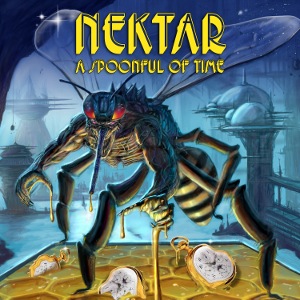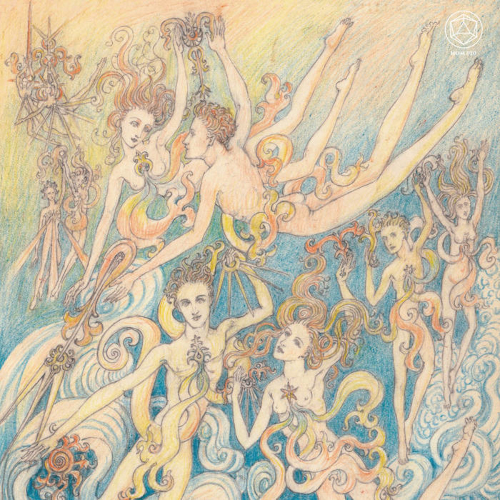Visiting the international DIY electronica scene market these days never leaves pre-disposed listeners with a shortage of produce to choose from. However, with so many common core ingredients in abundance – such as vintage modular kit flavourings and conceptual protein – zooming in on those seemingly most able to refine their recipes, is a means to limit overstocking the synth pantry shelves.
Enter then, four relatively divergent but loosely familial platters for a tasting session.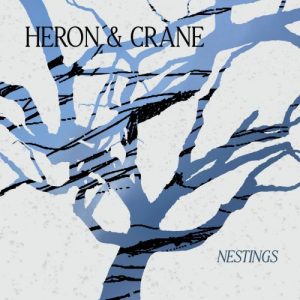 Certainly, the most organically-reared LP here is Heron and Crane’s Nestings (Hibernator Gigs), featuring the fraternity of Dave Gibson (Personal Bandana) and Travis Kokas (Cryptids After Dark) reconvening for the third time.
Certainly, the most organically-reared LP here is Heron and Crane’s Nestings (Hibernator Gigs), featuring the fraternity of Dave Gibson (Personal Bandana) and Travis Kokas (Cryptids After Dark) reconvening for the third time.
Although it could perhaps have been more interesting, if further parts of the record had been developed into ‘proper’ voice-led songs (beyond the notable Notorious Byrds Brothers-meets-early-Pink Floyd strains of “Tribal Knowledge” and the Peter Gabriel-gone-hazy epilogue of “Wool Gathering”), Nestings is still a satisfying selection.
It finds the pair shifting through The Shins-do-Musik von Harmonia balminess (“Ureshiku Mo”, “Morning Ritual” and “Excited Paw”); wonderfully warming William Tyler-like ambient Americana (“On Fossil Beach”); The Twelve-Hour Foundation-in-a-saloon-bar wobbliness (“Themes”); and skewed space-age exotica (“These Heretics”, “Crownbeard” and “Sparklers”). Imbued with uplifting mind-melding throughout, Nestings is a charmingly crafted bundle of subtle pleasures all told.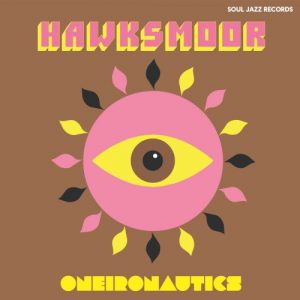 Taking decidedly darker one-man routes is the Bristol-based James McKeown, returning under his Hawksmoor alias with Oneironautics (Soul Jazz). Although being a little more restrained in his release rate of late – seemingly the result of now having a formal record deal in place with Soul Jazz instead of looser nomadic arrangements with the likes of Spun Out Of Control and Library Of The Occult – there is now arguably greater space for increased inner-world focus.
Taking decidedly darker one-man routes is the Bristol-based James McKeown, returning under his Hawksmoor alias with Oneironautics (Soul Jazz). Although being a little more restrained in his release rate of late – seemingly the result of now having a formal record deal in place with Soul Jazz instead of looser nomadic arrangements with the likes of Spun Out Of Control and Library Of The Occult – there is now arguably greater space for increased inner-world focus.
Hence, under an enveloping nocturnal shroud, Oneironautics traverses through McKeown’s self-described ‘pagantronica’ modes (“Parallelograms”); new-agey twists on early-Tortoise (“The Transcendentalist” and “Glass Teeth”); ecclesiastical ambience (“Galadali”); Cocteau Twins-meets-Durutti Column languor (“Traumzeit”); unapologetic Freak Zone-friendly proginess (“Salpêtrière”); primordial Frippertronics (“Nereides”); and electro-acoustically latticed Popol Vuh infusions (“A Forest In The Sky”).
Though at times the weighty moodscapes of Oneironautics could do with a tad more light, to provide newcomers with easier ways in, there is little doubt that the Hawksmoor planet is continuing to regenerate its topographies with absorbing agility.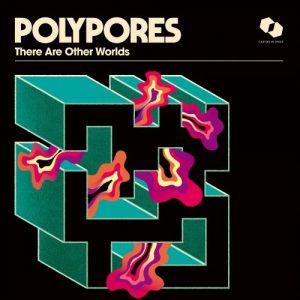 Another artist at one with the cables, sockets and dials in his electronic sound laboratory is Preston’s renowned modular synthesis sculptor Stephen James Buckley, trading via his Polypores pseudonym. As a plentiful producer of sonic goods that seek to funnel otherworldly themes into liberating soundscapes that are issued as consistently well-presented physical artefacts, Buckley is not one to be held back.
Another artist at one with the cables, sockets and dials in his electronic sound laboratory is Preston’s renowned modular synthesis sculptor Stephen James Buckley, trading via his Polypores pseudonym. As a plentiful producer of sonic goods that seek to funnel otherworldly themes into liberating soundscapes that are issued as consistently well-presented physical artefacts, Buckley is not one to be held back.
Yet a new desire to put out Polypores recordings more in line with the chronological order of their creation as well as logistical processes have dictated that There Are Other Worlds (Castles In Space) arrives as the first ‘official’ album since last September’s Multizonal Mindscramble on Ian Boddy’s DiN label. That is if we set aside, for simplicity’s sake, assorted Bandcamp subscription wares and a still-fresh ostensible outtakes CD — The Album I Would Have Released In An Alternate Universe – snuck out recently as an aural companion to the latest issue of Moonbuilding magazine.
Those expecting a straightforward bonus follow-on from the ambient-meets-new age trilogy of 2019’s Azure, 2020’s Flora and 2023’s Praedormitium for Castles In Space will find There Are Other Worlds to be a far more restless record. One which leans back into the playful-poltergeists-in-the-machine-meets-cosmic-jazz of prior Polypores’ full-lengths such as Chaos Blooms (Polytechnic Youth) and Crystal Shop (Waxing Crescent) from 2021, but overlaid with the conceptual calm of 2020’s Bandcamp-only Universe B. Therefore, across the twelve largely succinct tracks we’re taken on a journey inspired by niche cultural references and personal reflections regarding alternate realities, refracted through a variety of Buckley’s audio prisms. This means steering us through mesmeric burbling (“The Warp Zone”), woozy outdoor airiness (“Virtual Forest Worlds”), rubbery percussiveness (“Follow The Magpie”), hyperactive minimalistic choppiness (“Reality Hacking”), elemental aquatic lapping (“Foreverglade”) and more besides.Whilst There Are Other Worlds doesn’t ultimately bring much that is radically new to the Polypores palette, it’s undoubtedly a slow-grower set, one that will reveal its own distinctive attractions over time. It also acts a solid start to the latest wave of stockpiled material to be let out from the house of Stephen Buckley, which is due to include sequential outings courtesy of Aural Canyon and Quiet Details in the near-to-mid-future.
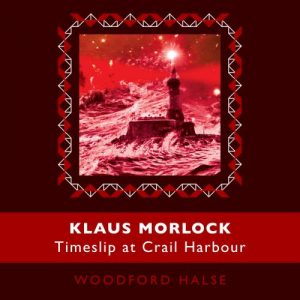 Over in the filmic hauntological side of things, the Los Angeles-dwelling Klaus Morlock unveils Timeslip At Crail Harbour (Woodford Halse). The collection manifests as an imaginary score to a folk-horror tale, mixing the strong aromas of gothic-era Tom Baker Doctor Who episodes with the shared obsessions of fellow travellers like Rupert Lally and Dream Division.
Over in the filmic hauntological side of things, the Los Angeles-dwelling Klaus Morlock unveils Timeslip At Crail Harbour (Woodford Halse). The collection manifests as an imaginary score to a folk-horror tale, mixing the strong aromas of gothic-era Tom Baker Doctor Who episodes with the shared obsessions of fellow travellers like Rupert Lally and Dream Division.
Whilst there has been no prior shortage of albums traversing the same tributaries as Timeslip At Crail Harbour during the last decade, it is one of the strongest exemplars of its sub-genre ilk from recent times.
-Adrian-

